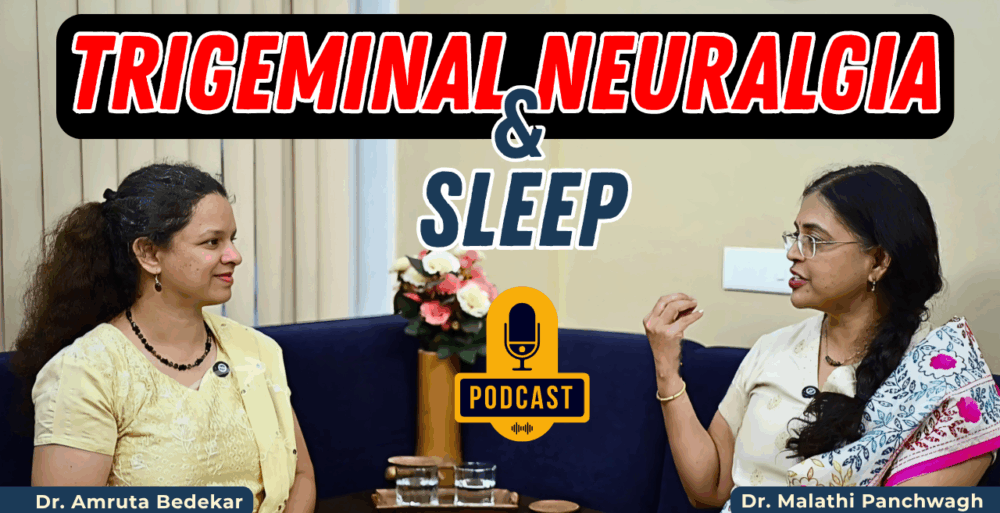How Sleep Affects Trigeminal Neuralgia: Expert Insights by Dr. Amruta Bedekar

Sleep is not just a way to recharge—it’s a critical factor in managing chronic pain conditions like trigeminal neuralgia. In this insightful podcast episode, Dr. Amruta Bedekar, a seasoned pain physician, dives into the often-overlooked link between sleep and nerve pain. She explains why getting quality rest is essential not only for overall well-being but also for reducing the frequency and intensity of trigeminal neuralgia attacks.
If you or someone you know suffers from this condition, understanding the connection between pain cycles and sleep patterns might just be the missing piece in your management plan.
The Vicious Cycle: How Pain and Sleep Affect Each Other
Dr. Bedekar explains that pain and sleep are part of a two-way loop. When you don’t sleep well, your body becomes more sensitive to pain. And when you’re in pain, your sleep quality drops. This creates a vicious cycle where one feeds into the other.
In patients with trigeminal neuralgia, even a minor disruption in sleep can act as a trigger for a pain flare-up. This could mean sharp, electric-shock-like facial pain after a night of poor rest—or waking up in pain and then struggling to fall back asleep.
Is It Just Lack of Sleep or Something More?
Many patients think their pain flares are random. But Dr. Bedekar emphasizes that even a slight change in sleep schedule, late nights, or interrupted sleep could be the underlying trigger.
She encourages patients to track their sleep patterns alongside pain flare-ups. This simple habit can reveal surprising insights: Was your pain worse after a sleepless night? Did your body react to a late dinner or staying up past your routine bedtime?
Breaking the Cycle: What You Can Do
Dr. Bedekar doesn’t just highlight the problem—she offers real-world solutions.
- Prioritize consistent sleep timing: Going to bed and waking up at the same time every day, including weekends, helps stabilize your body clock.
- Avoid late dinners and screen time: Both can interfere with deep sleep, which is essential for nerve recovery.
- Don’t skip medication: Pain medications should be taken consistently, especially at night, to help maintain pain control and sleep quality.
- Practice sleep hygiene: Keep the room cool, quiet, and dark. Use calming techniques like gentle stretching or deep breathing before bed.
Why You Shouldn’t Ignore Sleep If You Have Trigeminal Neuralgia
Sleep is not a luxury—it’s therapy. According to Dr. Bedekar, deep, restorative sleep helps modulate nerve activity, improving the body’s pain threshold. Patients often see a reduction in pain frequency and intensity when their sleep improves.
Schema-Ready Q&A Section
What is the link between sleep and trigeminal neuralgia?
Poor sleep can lower your pain threshold and act as a trigger for trigeminal neuralgia flare-ups. In turn, the pain can disturb sleep, creating a cycle of worsening symptoms.
Can staying up late worsen nerve pain?
Yes. Dr. Bedekar explains that even small changes in your sleep routine—like staying up late—can act as a trigger for facial pain.
How can sleep tracking help in managing trigeminal neuralgia?
By keeping a sleep diary and noting when flare-ups occur, patients can identify patterns and triggers that might be affecting their pain.
What sleep habits can help reduce trigeminal neuralgia attacks?
Maintaining a regular sleep schedule, avoiding late dinners, managing screen time, and taking medications on time can all contribute to better pain control.
Is pain more common at night in trigeminal neuralgia patients?
Not necessarily for everyone, but many patients report increased pain during or after poor sleep, especially in the early morning or late-night hours.
Final Word from Dr. Bedekar
“Pain and sleep are interlinked,” says Dr. Bedekar. “It’s not always about what you did that day—but what happened the night before. Quality sleep can make a world of difference in how you manage trigeminal neuralgia.”
Written by:
Dr. Malathi Panchwagh
Anesthesiologist | Perioperative physician

A distinguished Brain and Spine Surgeon, shaping neurosurgical care in Pune, Maharashtra, India for over two decades.
Quick Link

Quick Contacts
- Phone : (+91) 9011333841 , (+91) 7720948948
- brainspine66@gmail.com
- 102, Bhagyatara Society, 1st floor, Mehendale Garage road, Erandwane, Pune
Map
- Copyright @2025 | Dr. Jaydev Panchwagh | Praavi Medicare

Leave a Reply